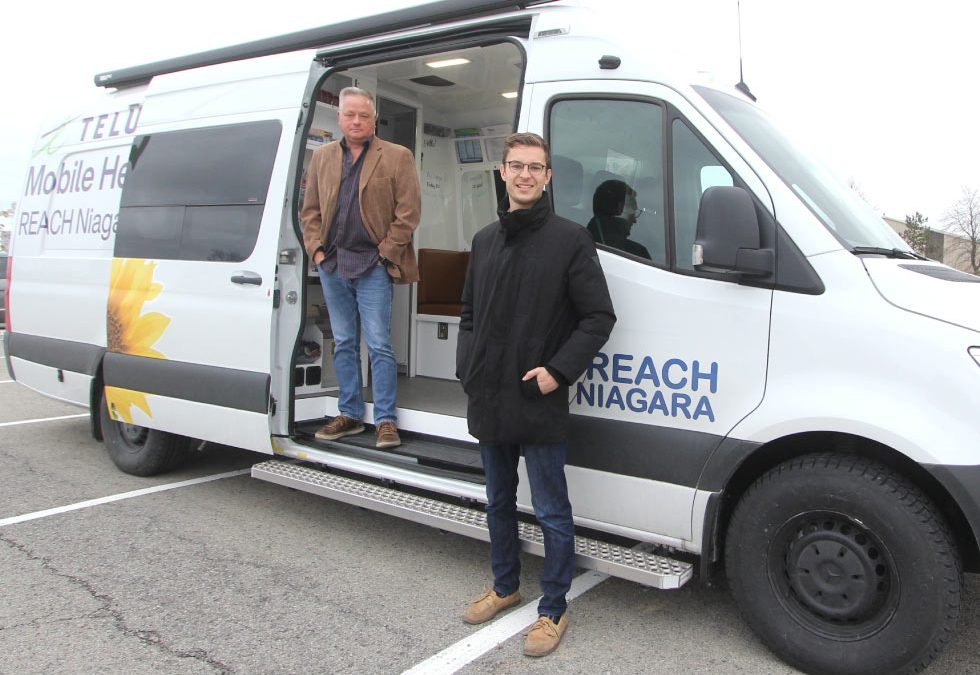Media release from the office of Sam Oosterhoff, Niagara West MPP
ST. CATHARINES – The Ontario government is supporting high-quality and compassionate health care for individuals experiencing homelessness in Niagara through an Alternative Funding Plan (AFP) partnership with the Shelter Health Network and REACH Niagara.
Announced today by Sam Oosterhoff, MPP for Niagara West, additional support from the province will increase the annual base funding to up to $935,000 for eight to ten new service sites in St. Catharines, Welland and Niagara Falls to provide primary care services to 1,500 patients in 2021/22. The commitment from the province includes an additional $425,000 in 2022/23 for two to three additional service sites to support another 500 unique patients.
A collaborative effort to increase access to primary care, REACH Niagara partners with local physicians and nurses, community health clinics, family health teams, as well as Niagara Public Health, Niagara EMS, and local shelters, to treat marginalized communities and individuals experiencing homelessness with dignity, kindness and respect.
The funding will flow through Shelter Health Network, which provides primary care for marginalized communities and individuals experiencing homelessness in Hamilton.
“This new funding extends care to marginalized and homeless members of our community who do not have a doctor,” said MPP Oosterhoff.
“The provincial support affirms the important work of Dr. Karl Stobbe, Medical Director, and David van Velzen, Executive Director, and their frontline team at REACH Niagara in bringing primary care to individuals in need, meeting more patients in more places.”
“Our government is proud to support the Niagara Region with this targeted investment to ensure its most vulnerable residents have access to better, connected, primary health care services,” said Deputy Premier and Minister of Health, Christine Elliott.
“This funding will help to provide comprehensive primary health care to individuals and communities, especially those at highest risk for illness, and protect our progress against COVID-19.”
“The team at Shelter Health Network is very pleased with this funding announcement and the partnership we have with REACH Niagara,” said Dr. Kerry Beal, Lead Physician of Shelter Health.
“The work of both of our organizations for the homeless and marginalized in Hamilton and Niagara is vital. Increasing this funding will go a long way in providing increased primary healthcare to those without access to a family doctor, specialists and psychiatrists. It is very exciting to see this come together.”
“REACH Niagara is thrilled with this announcement and our partnership,” said Dr. Karl Stobbe, Medical Director of REACH Niagara.
“We have been in discussions with Shelter Health, Dr. Beal and the Minister of Health’s office for quite some time. To see this come to fruition is fantastic. Our goal is to improve the lives of those we serve, and this funding will improve access to family doctors and specialists and is a game changer for REACH; more importantly for the people in Niagara who are poor and marginalized. We could not be happier with this outcome.”
“This is wonderful news for our organization,” said David van Velzen, Executive Director of REACH Niagara.
“We are a small group working with community organizations to provide healthcare to the homeless and marginalized in Niagara. We have experienced great support for this funding plan from our regional politicians, city leaders, our partners in the community health centres, family health teams, Niagara Health, Niagara Region and our MPP’s in the region, with MPP Oosterhoff assuming the lead for REACH. Everyone recognizes the importance of this work and this funding plan will only improve and increase the healthcare we can provide to this community.”
A collaborative effort to increase local access to primary care, REACH Niagara partners with local physicians and nurses, community health clinics, family health teams, as well as Niagara Public Health, Niagara EMS and local shelters, to treat marginalized communities and individuals experiencing homelessness with dignity, kindness and respect.”
The targeted support is part of the province’s broader strategy to prevent homelessness and support people experiencing or at risk of homelessness.
- The Government of Ontario launched a new strategy to combat homelessness in March, directing municipal service managers to begin collecting detailed, up-to-date information from individuals experiencing homelessness and use a strategy called by-name lists. By-name lists collect detailed information and help match people with required supports.
- As part of its Community Housing Renewal Strategy and response to COVID-19, Ontario is investing approximately $1.75 billion in 2020-21 to help sustain, repair and grow community housing and help end homelessness.
Additional Resources
- Not having health cards nor the ID necessary to obtain one;
- Not having a phone or address to receive appointment information;
- Feeling stigmatized when they access care.
Shelter Health brings health care directly to people who face the most barriers in accessing it. Shelter Health is also committed to teaching medical students, post graduate residents and other health professionals. The network’s experienced health care providers help learners understand the social determinants of health.
